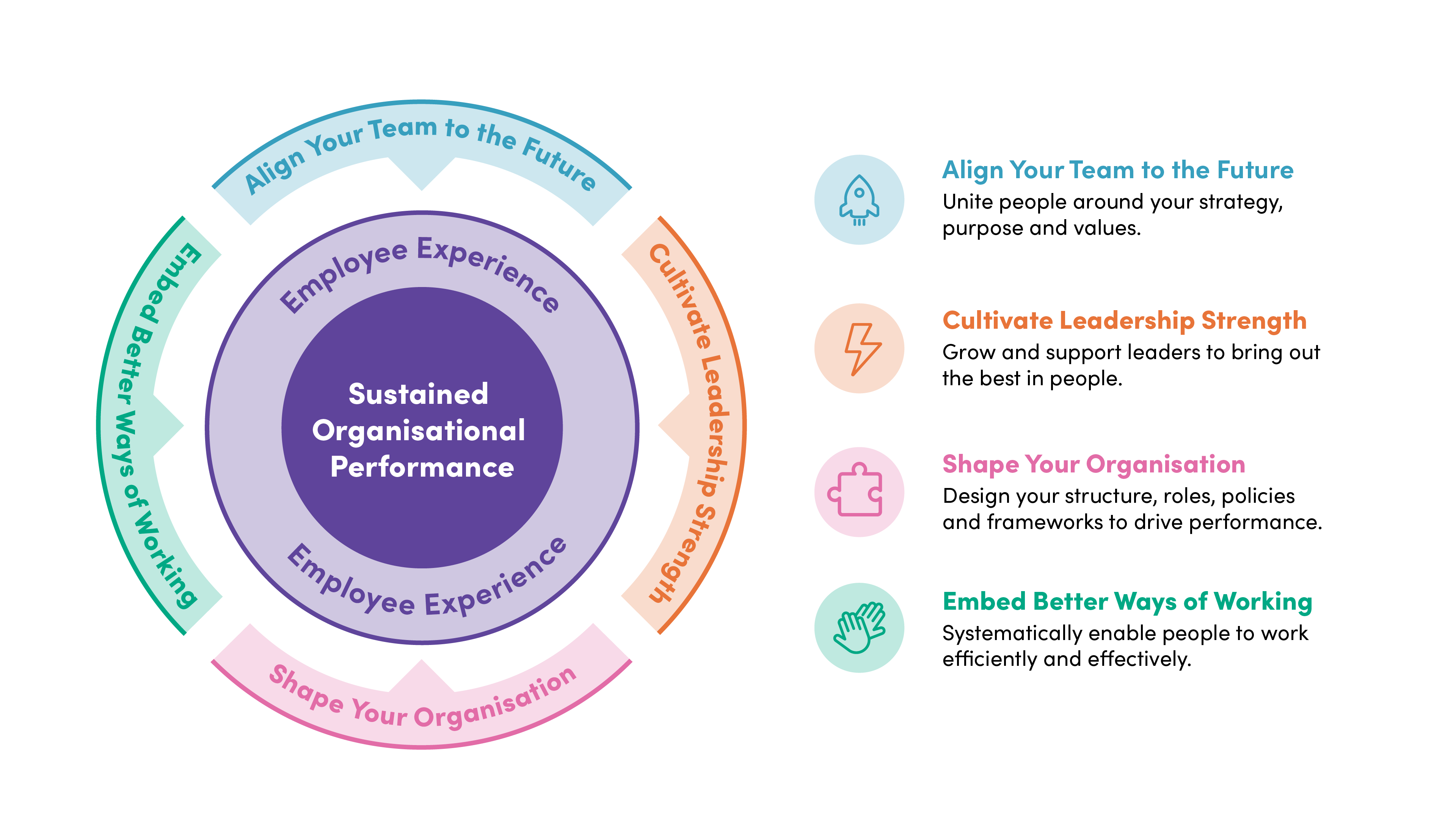Align Your Team to the Future
Q. What are your focuses/aspirations for 2024?
KALYN PONTI:
2023 was full speed for me as CEO, as it was for our team and a lot of leaders out there. Early this year, we are taking the time to stop, pause and assess our strategy to make sure it's fit for the changing context, applying hindsight, insight, and foresight. Taking this time to work "on" the business is central to my role as CE, and that of our leadership team. We are extremely excited to continue innovating around our services and how we design experiences in the new world of work. While many of the fundamentals around work remain, several paradigms are completely shifting so doing things the same way is leaving opportunity on the table. Lastly, my focus is always on our team. Our team is the lifeblood of Humankind's ability to innovate and design box-breaking solutions with our clients.
Q. Why include people performance as part of your strategic planning process?
JENNY WILLIAMS:
You cannot deliver your strategic priorities without your people. It is therefore critical to include a people strategy as part of the overall business strategy and to consider the employee experience you need to create for your people to enable them to perform at their best. We firmly believe that if you focus on intentionally designing your employee experience you're going to drive people performance and sustained organisational performance. As part of your people strategy you should also consider the key measures to track the impact of improving your employee experience on your people’s performance.
Q. What are the best ways for organisations to inspire and motivate their employees around an updated or new strategy?
ANNA MUIR:
Communicate it and then communicate it some more! Ensure that all your people understand the role they play in helping to achieve the strategy by breaking it down for individual teams, discuss with them how they feel that they can contribute, and then translate this into goals.
Cultivate Leadership Strength
Q. What key leadership capabilities will have the biggest organisational impact in 2024?
ANNA MUIR:
I think empathy and accountability will be key. We talk about this as leading with heart and head. Showing up for people when they need support and being visible and present no matter what format that takes (online presence is still presence); and also setting clear expectations with your teams and holding them to account. 2024 won’t be without its challenges and we shouldn’t be afraid of asking people to perform at their best and demonstrate what this looks like.
Q. What should leaders be thinking and doing at the beginning of the year to set their teams up for success?
KALYN PONTI:
Reconnect your team to your purpose. Give it meaning by doing something creative such as sharing end-user stories or doing site visits. Be honest about the realities of this year, what people can expect, and how you plan to attack 2024. Clearly communicate priorities for the quarter along with accountability, and expectations for each person. Connect and engage with people- build relationships and know what matters to them. The world is relational, not transactional.
Q. What are the biggest leadership lessons that you learned in 2023 that you want to bring forward into 2024?
ANNA MUIR:
No matter how awesome your team is (and my team is awesome!), leading is tough if you want to lead well. As leaders, we have an experience too, and we have to ensure that we have the support networks in place so that we can show up at our best! Also, lean into the hard conversations, your people will appreciate the feedback, as long as you explain the rationale and actually believe what you are saying.
Shape Your Organisation
Q. What advice would you give to organisations wanting to stand out in the hiring market in 2024?
CHARLOTTE BATES:
Organisations need to be able to clearly articulate their purpose and values. More and more candidates are looking to work with organisations that have values that align with their own, so communicating them upfront is critical. The other thing is being clear on your Employee Value Proposition (EVP) before going to market. Candidates really want to understand what working at your organisation would look like. If you can nail these things, you will build an emotional connection with candidates who really want to work for your organisation as they understand who you are as an organisation and what you are all about.
The other thing to keep in mind is your hiring process. The employee experience starts from that first interaction potential candidates have. If you don’t give candidates a good experience at the recruitment stage, they’re going to question what it might be like to work for you. To really stand out, think of ways to elevate the process as much as you possibly can to showcase and give candidates a taste of what it’s like to work at your organisation.
Q. For organisations looking to optimise the way they operate in 2024, what advice would you give them?
CHARLOTTE BATES:
Look at our model above and see how you're tracking against the four pillars. For example, is your strategy clear and do your people know how their mahi contributes to achieving your future goals and vision. Do your leaders have the skills and capability to support and grow their people but to also have the tough conversations? Is your organisation structured in a way that enables your people to perform at their best? Do you have rhythms and rituals that enable your teams to work together to deliver what they need to? Sometimes only small changes are required to get your people humming.
If you need to take more of a drastic approach to ensure your organisation remains financially viable, such as a restructure, consider how you can make the change in a way that is people-centred. Putting people at the centre of your restructure plan will set your organisation up for ongoing sustainability with engaged employees. Check out my article Beyond the Bottom Line: The key to a successful, people-centred restructure if you’d like to read more on the topic.
Q. For organisations that have undergone significant changes in 2023, what advice do you have to rebuild trust, reconnect people and reinvigorate culture in the new year?
JENNY WILLIAMS:
So many organisations going through significant change focus on the change process itself and forget about the ‘what next’. We encourage employers to deliberately plan how they are going to embed a new structure and rebuild their desired organisational culture. Following change, it is critical leaders are aligned to the direction of the organisation and how they are going to lead their people going forward. Leaders may have new teams so should consider how they will onboard them and set up deliberate rhythms and rituals for them to connect and work together effectively. Key aspects of a leader's role at this time are communicating the purpose and vision of an organisation, supporting their people through the transition and encouraging them to think about what their bright future in the organisation looks like.
Embed Better Ways of Working
Q. What are some common inefficiencies you see in the way organisations operate?
CHARLOTTE BATES:
A common inefficiency I see is meetings with no clear agenda or purpose. It is also a common complaint from employees! It’s important to be really deliberate around your meeting rhythms and rituals to make sure they enable people to collaborate and work towards your goals – don’t be afraid to remove meetings if they are no longer needed! The New Year is a great time to examine your rhythms and rituals to make sure they are setting you up for success.
Another inefficacy we often come across is a lack of role clarity, with people not understanding how their role fits into the bigger picture and effects the end user, customer, or product. This connection is crucial as it gives people a sense of purpose at work, motivates them and helps them come up with innovative solutions. It’s a win-win.
Q. What advice do you have to help organisations seamlessly embed new ways of working initiatives?
KALYN PONTI:
Firstly, pay attention to it! Start by gathering insight on how work is carried out in your organisation. Don’t do this in isolation, involve your team in improving or designing new ways of working - this could include meetings, rituals, comms, use of tech or operating models. It’s important to get input from various diverse perspectives. Bake the most integral elements of your operating model, such as sales, feature releases, or values right into your regular rituals and habits, and be really clear on the why when launching new ways of working. Consider building in an overview of ways of working into onboarding so new team members are across it from the get go. At Humankind, we've just completed "Personal Operating Manuals" which help our team work together more effectively.
Q. What are some quick-wins that organisations can experiment with in the New Year to improve team efficiency?
JENNY WILLIAMS:
The quickest and easiest win is to talk to your people. Understand their experience at work and what they believe could be improved and have the biggest impact. They're the ones doing the mahi so will have great insights on how to operate more efficiently.
One thing that always seems to impact team efficiency are meetings. The start of a new year is a great time to look at your meetings and identify if they have a clear purpose, are engaging and adding value. Take the time to understand from your people what they need from meetings and design your rhythms and rituals to meet those needs.

